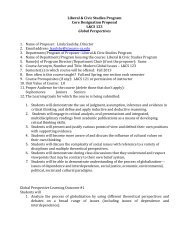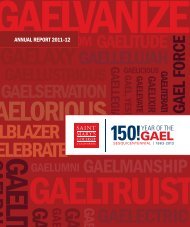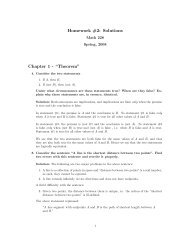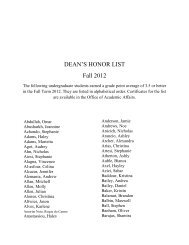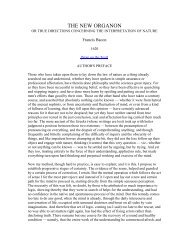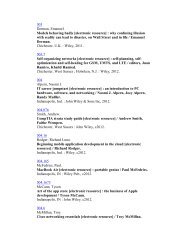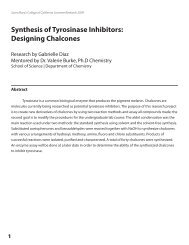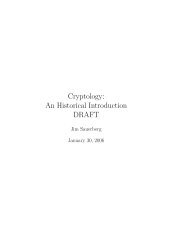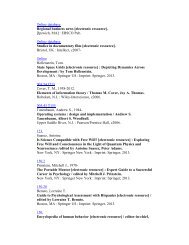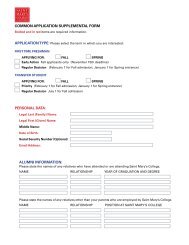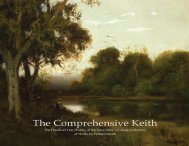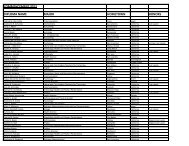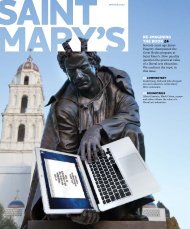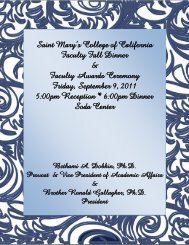2008-09 Catalog - Saint Mary's College of California
2008-09 Catalog - Saint Mary's College of California
2008-09 Catalog - Saint Mary's College of California
Create successful ePaper yourself
Turn your PDF publications into a flip-book with our unique Google optimized e-Paper software.
Kinesiology CurriculumLearning OutcomesUpon completion <strong>of</strong> the graduate program, students will be able to:• Identify and explain relevant theories, research, and practices in thedisciplines <strong>of</strong> psychology, sociology, philosophy, law, administration,and physiology as they relate to sport and physical education.• Distinguish between poor and good research in the abovementionedsubdisciplines.• Design research studies to address important questions in each<strong>of</strong> the subdisciplines within kinesiology.• Demonstrate the necessary library research skills and computerliteracy in a review <strong>of</strong> literature on a chosen topic for each subdiscipline.• Recognize and utilize effective leadership practices.• Analyze critically various philosophical perspectives on moral/ethical issues.• Demonstrate mastery <strong>of</strong> the law as it relates to the pr<strong>of</strong>ession.• Design effective and efficient physical training regimens thatincorporate psychology, physiology, and motor learning principles.• Identify and reflect upon specific values and beliefs that areimportant to personal success in their chosen career.• Evaluate standardized tests in the field (cognitive, affective,physical, and psychomotor) and administer these tests whenappropriate.• Demonstrate effective communication skills — both writtenand verbal.Graduate Program Curriculum280 Colloquium (every summer)During the first week <strong>of</strong> each summer session, a group <strong>of</strong> leading scholarsand pr<strong>of</strong>essionals is invited to campus to address the department’sgraduate students. The four-day colloquium focuses on one <strong>of</strong> thefollowing contemporary issues in our field:• Females in exercise and sport• Improving human performance• Ethnicity and race as factors in the college athletic experience• Character development through sport and physical education200 Introduction to Graduate Study and Research(first-summer course)This course is an introduction to science and research in kinesiology.It is designed to foster an understanding <strong>of</strong> the research employed inthe subdisciplines. It is also intended to prepare the student to writecomprehensive literature reviews. Ethical issues in research are discussed,the qualities <strong>of</strong> good research are reviewed, and students learn how tocritically analyze the empirical research in our field.205 Philosophical Foundations <strong>of</strong> Kinesiology(first-summer course)This course is an introduction to the basic foundations <strong>of</strong> philosophy asthey relate to the sport and physical activity domain. The course isdesigned to promote an understanding <strong>of</strong> the nature <strong>of</strong> philosophy andthe major schools <strong>of</strong> philosophical thought. Topics include the importance<strong>of</strong> philosophy to physical education and athletics; various teachingand coaching philosophies; ethical issues in sport and physical activity(e.g., drug use); and close examinations <strong>of</strong> contemporary social issuesassociated with race, ethnicity, and gender.230 Supervision and Legal Aspects(second-summer course)This course focuses on proactive risk management for teachers,coaches, and administrators that will minimize their organizations’ legalliability. Topics include an overview <strong>of</strong> the legal system; tort liabilitythrough negligence in supervision; facility care and maintenance; and hiring.These topics will be examined primarily in the context <strong>of</strong> the caselaw in <strong>California</strong> courts.270 Psychological Analysis <strong>of</strong> Sport and Exercise(second-summer course)This course is an exploration <strong>of</strong> the psycho-social dimensions <strong>of</strong> physicalactivity. Current theories and empirical research are discussed in aneffort to understand the mental aspects <strong>of</strong> sport and exercise. Topicsinclude goal orientation, motivational climate, self-esteem, arousal regulation,performance-enhancement techniques, leadership, and characterdevelopment through sport.220 Administration <strong>of</strong> Kinesiology(third-summer course)This course is designed to give students an understanding and appreciation<strong>of</strong> the administrative process as it applies to school and collegephysical education and athletic programs. Current literature in the areas<strong>of</strong> business and management are discussed. Topics include developingadministrative styles; diversity issues as they relate to effective management<strong>of</strong> human resources; revenue acquisition and budget development;media relations; intraorganizational competition; sponsorship acquisitionand retention; marketing; and event management.275 Applied Exercise Physiology(third-summer course)This course is a study <strong>of</strong> the physiological adaptations that the bodymakes to exercise. Current theories and empirical research are appliedto the response <strong>of</strong> acute exercise and the chronic adaptations that occurin the metabolic, cardio-respiratory and musculoskeletal systems. Thisprovides the basis for constructing suitable conditioning programs forsport and exercise participation. In-class laboratories are designed topresent measurement techniques and evaluate physical fitness.201c Comprehensive Examinations(end <strong>of</strong> third summer)A full day culminating experience for the graduate program’s students.224 Human Motor Performance(evening course)This course is an overview <strong>of</strong> the neurophysical foundations <strong>of</strong> motorbehavior in the sport and physical activity domain. Current theories,empirical research, and applied practices in the areas <strong>of</strong> coaching, psychology,pedagogy, and motor-skill development are discussed. Topicsinclude motor program theory, facilitating an ideal learning environment,and the roles <strong>of</strong> the learner and the instructor in motor-skill acquisition.278 Sociohistorical Aspects <strong>of</strong> Health, Sport, andLeisure (evening course)Investigates health, sport, leisure, exercise, and concepts <strong>of</strong> the bodyin past societies as well as in contemporary industrialized nations.Our field’s past and present link to medicine and public health is alsoexplored. The beliefs and practices <strong>of</strong> different social aggregates (ethnic,racial, age, and gender) with regard to the body are examined. Analyses<strong>of</strong> past and present scholastic, collegiate, national, and internationalsport models are also undertaken.119



